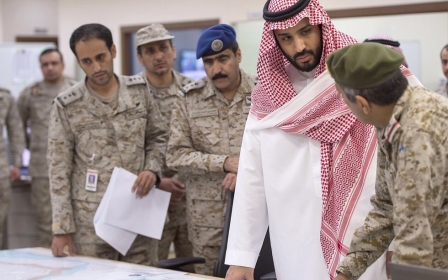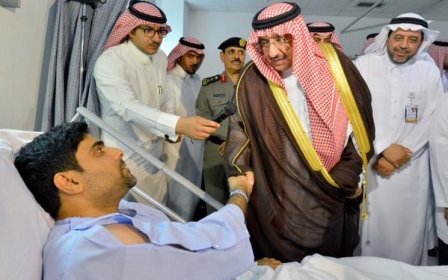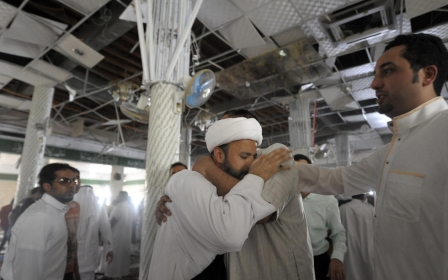Saudi’s sectarian discourse threatens to spin out of control

A second bombing attack in a week on Shia worshippers in Saudi Arabia’s Eastern Province has underscored both a security issue and a rising tide of sectarian violence in the kingdom.
This Friday’s attack by a suicide bomber on a mosque in Dammam has left four people dead and at least four wounded. Only a week ago another bomber blew himself up at a mosque near the city of Qatif, killing 21 and leaving more than 100 wounded. And it is barely six months since gunmen attacked a religious ceremony in Al Dawola, a small town in Eastern Province, killing eight. The victims were Shia, the attackers Sunni Islamist extremists.
“People are really nervous, some with anger and some with fear and those emotions are rising together,” a doctor who asked not to be named told me, moments after the Dammam attack. He added “the main fear is that these attacks in our region will continue”.
Jaffar Alshayeb is a businessman and commentator in Eastern Province. He links the attacks to what he calls “the sectarian discourse” in Saudi Arabia.
“There is no way that the government can secure every mosque from an attack,” he says. But he argues that it could be doing more to stem the flow of anti-Shia rhetoric which he believes is stoking sectarian violence.
In a recent article, he wrote of a “discourse of hatred being promoted through various media. It is radicalising young (Saudis) and pushing them to join extremist groups.” That discourse routinely includes terms of contempt for Shia such as rafida or refusers, Iranian traitors, and Safavids or Persian Muslims. Alshayeb adds that despite promises over the years to de-radicalise school texts, the problem still persists: “Shia are accused of being non-Muslim in the curriculum.”
He is not alone in expressing deep concern about the apparent disinterest of the government in presenting an alternative narrative to the sectarian discourse. Veteran journalist and commentator Khalid Al Maeena writing last week in the Saudi Gazette did not pull his punches:
“For too long, we have kept quiet as they [extremists] used the mosques, the media and all other forms of communication to spread their evil philosophy. We did not do anything and watched silently as some imams spewed hatred and spread falsehood about Muslims of other sects.
"These illiterate bigots should have been advised to shut up and we should not have remained silent and passive allowing their hatred to continue, giving them the opportunity to manipulate the minds of many.”
Just how far that “evil philosophy” has penetrated can be measured in Saudi online responses to the latest attack. Saad al Faqih, a London-based conservative critic of the ruling family, monitors social media in the kingdom. He told me the response in the immediate aftermath of the Dammam attack was diverse. “There were some who expressed sympathy for the Shia but the Daesh (Islamic State - IS) supporters were jubilant. [They said] ‘let the Shia be killed’”.
He argued that the attacks undermine the credibility of Mohammed bin Nayef, the crown prince and interior minister. Senior Shia religious figures in Eastern Province had already called for the formation of citizen forces or al-hashid al shaabi to protect their community from further attacks. Indeed, it was one such unarmed group in the Dammam attack that prevented the bomber from entering the mosque, disguised as a woman. When confronted, he blew himself up in the parking lot killing all the guards.
“Just last week Mohammed bin Nayef said to (Shia) there was no room for anyone to take the role of the state, that was the ministry’s job - but look what has happened. Shia are saying the state cannot protect them.” That, Al Faqih said, has made IS supporters in the kingdom “very happy to see a war between the Shia and the interior ministry”.
IS regards the ruling House of Saud as unIslamic and deserving of death, so any further rifts between the Shia community and one of the most powerful members of the Al Saud is welcomed as a sign that the family’s power is weakening
Adding further fuel to the sectarian fire is the war in Yemen. It remains popular among many Saudis even though the bombing campaign has yet to come close to defeating the Houthis. Increasingly, Jaffar Alshayeb says, the war is being presented as a Sunni-Shia conflict not a battle between the Saudi state and Yemeni rebels.
“The war is being transformed into a sectarian war and in local media and in Friday prayers it is being presented as the time to get rid of the Shia. This is very dangerous and as long as the war goes on the danger is that the sectarian discourse only gets stronger.”
The concern that he and other commentators are expressing is one that King Salman should be listening to. However, the king is viewed as being closer to the religious elite than his predecessor King Abdullah. It is perhaps telling that he chose to spend his time meeting with conservative imams rather than attend the Camp David summit hosted by President Obama in early May.
Telling too, that the response to these latest attacks by the ruling family has been muted when compared to the Al Dawola attack last year, when King Abdullah was still alive. Then Mohammed bin Nayef travelled to Eastern Province and met personally with senior Shia clerics, community leaders and families of the victims. He made a similar trip earlier this week where he was confronted by a brother of one of the victims of last Friday’s attack. A video showing him pushing the man in the chest has gone viral. With both anger and fear growing among Saudi Arabia’s Shia citizens, Mohammed bin Nayef would do well to put in another appearance.
But if the drift toward further terrorist violence is to be stopped, more than a photo opportunity is called for. Surely now is the time for the government to sort itself out and come down hard on those who espouse a sectarian discourse rooted in religious hatred and intolerance.
- Bill Law is a Sony award-winning journalist. He joined the BBC in 1995 and since 2002 has reported extensively from the Middle East, including the Kingdom of Saudi Arabia and Iraq, where in 2003 he was one of the first journalists to cover the beginnings of the insurgency. His documentary The Gulf: Armed & Dangerous, which aired in late 2010, anticipated the revolutions that became the Arab Spring.
The views expressed in this article belong to the author and do not necessarily reflect the editorial policy of Middle East Eye.
Photo credit: Saudi Defence Minister Mohammed bin Salman bin Abdul Aziz (2nd R) meeting with Saudi air forces officers (AFP)
New MEE newsletter: Jerusalem Dispatch
Sign up to get the latest insights and analysis on Israel-Palestine, alongside Turkey Unpacked and other MEE newsletters
Middle East Eye delivers independent and unrivalled coverage and analysis of the Middle East, North Africa and beyond. To learn more about republishing this content and the associated fees, please fill out this form. More about MEE can be found here.





